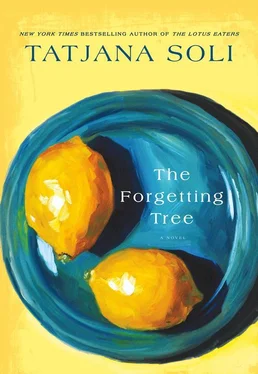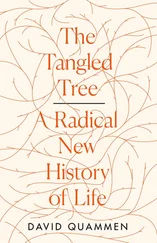“Yes, I would like to read sometime,” Marie said.
“Hmmm.” Linda had already forgotten her.
Marie was sure Linda would not remember because she never remembered their talks, repeating instructions to her over and over, although Marie always pretended to hear them as if for the first time, never telling her that French, not Spanish, was spoken on her island, but the next day Marie found a book on her bed, Wide Sargasso Sea .
Once she opened the book, she was home. She knew Antoinette’s mother-loss, but also knew the peace of her childhood in abandoned Coulibri, the joy of nature, living under trees, how it made the hatred not sting so much. She understood how the convent felt like a refuge, a place of sunshine and of death, because Linda’s house felt the same way to Marie. She never wanted to leave. Would her fate in Florida turn out better than Antoinette’s in Rochester’s bitter England? She would make something of herself, she hoped, she prayed.
She did not remember her work that day, much less to eat. For the first time, she had the experience that another human being had felt much the same as she did, that her life was not so unique. Never again would she have to feel so alone. This was the release of art, what Maman must have felt while she painted vodou figures. Loneliness had stuck in her bones since Maman died, and this was the first time the pressure released just the smallest bit. Parts of the novel made her cry, and when she bent her head down close to the pages, she imagined the tears on the paper smelled of the island’s flowers. Was it a lingering trace of Linda’s perfume or her own longing for home?
When Linda had left that morning, Marie had stayed in her room and did not clean a single thing, and when Linda came home that night, she absentmindedly praised Marie’s work, saying the place looked perfect. She was right because it was unchanging, never anything less than perfect. But reading that book, Marie was more exhausted than if she had cleaned without stopping all day.
* * *
The day before Christmas, Linda packed for a trip with James. “Tomorrow clean out my closet thoroughly so it’ll be straightened when I get home.”
“Tomorrow is Christmas,” Marie said.
“Oh, I forgot.” Linda went into her bedroom and came out with a hundred-dollar bill. “Here you go. I always have some stashed for a rainy day. Polish my shoes, too.”
Marie learned to adjust to silence and quiet. The only people she saw each week were the people who serviced the house — postman, gardener, pool man. They waved at Marie through the windows, and she waved back. Once a month, she called Coca, who invited her to family dinners, but the trip back and forth was too long for Linda not to complain of the inconvenience of not having her. Marie went twice: for Christmas Day and again in the spring for a funeral.
But Coca and Marie did not really know each other. When Marie was lonely, she called Jean-Alexi. Sometimes just to hear his voice, then she’d hang up. Sometimes she’d cry on the phone. He would not comfort her, but he would not hang up either. When he was in a good mood, which was less and less frequently, she got him to talk about the island, the village, and Port-au-Prince. Their days in her father’s abandoned house grew into a missed opportunity, something she knew was false from reality, but they both allowed this. The story of the lone cricket turned into a whole orchestra of crickets that serenaded their lovemaking. Eventually Jean-Alexi would ask her where she was or suggest they meet, and then she would quickly hang up. She knew her loneliness and homesickness were misleading her. But he was the only link to who she was.
* * *
Linda finished the long paper on Jean Rhys, and James threw a party at a restaurant because she did not want the house dirtied. Although it was at a Caribbean restaurant, with food and music of the area, they had not thought to invite Marie. Afterward, Linda put a signed, first-edition copy of Wide Sargasso Sea in a glassed shelf of her bookcase — a present from James. When she left for work, Marie took the book out and stared at the signature, thrilled at this proof that the actual person who had expressed her deepest thoughts had held those pages. She imagined the yellowed paper smelled of spices.
What confused her was that she could not complain about her living conditions or the ease of the work — she had never dreamed such luxury possible — but the lack of human company made her feel as if she had already left the earth and existed in some kind of limbo. Wrong to say she wasn’t grateful to leave the filth and poverty, but she had also left the company of other human beings. One morning as Linda rushed out, Marie could not contain herself.
“What do you believe in?”
Linda stopped in her tracks — exasperated, irritated. “What do you mean?”
Marie regretted the question. “What makes you happy?”
“James. My house. All kinds of things. I don’t think it’s an appropriate topic.”
Linda never asked a single question about Marie’s life and clearly did not want to know. Marie might spend the rest of her life in that house, and she would die unknown, a stranger.
* * *
As soon as Linda left each morning, Marie turned on the televisions that were in every room, each tuned to a different station, so that as she moved through the house working, it was as if she were moving through a crowded village. She would stop and catch up with the goings-on in each room. Talk back to the screens. A soap opera on one; a game show on another; the news; a movie; a talk show. Her speech improved rapidly, moving from the stilted Queen’s English to American casual.
When her work was over for the day, she usually found herself lingering in Linda’s closet, looking at the clothes. Knowing that Linda would be away the whole day, at first she would try on a coat, a dress. Eventually, she grew braver, putting on whole outfits with shoes and makeup and jewelry. The girl that appeared in the mirror was unimaginable to her. This time she christened herself: Minna.
She did not intend it to happen, but the outside world began to fade, and the imaginary one created in the mirror became the only one that satisfied. Her dreams were the dreams of the girl in the mirror, not the real one dressed up in someone else’s life.
* * *
One day she opened the small drawer in Linda’s nightstand and found a gun. Heart pounding, she picked it up, surprised at its cold heaviness and how soothing it felt in the hand. She carried it carefully, marveling at its weight and how invincible it made her feel. It almost made her want an invader to break into the house so that she could prove her bravery. Each time she came upon a mirrored image of herself, she took aim, pretending she was one of the pretty actresses on television who aimed guns and were never hurt. What, she wondered, could frighten Linda so much, living in this perfect world that Marie found as safe, if dead, as heaven?
* * *
Although she knew her time here could not last forever, she hoped it would be long enough to plan what to do next. Almost two years had passed when Linda called her into the kitchen one night after she came home, and Marie saw something unfamiliar in Linda’s eyes: happiness.
“James and I are getting married!”
“That’s so good.” Marie felt honored that Linda was announcing it to her, as if they were family. She assumed her life would not change, except she would be cleaning after two people now. She liked James because he talked to her as if she were more than the girl who cleaned Linda’s house, as if she were a person with her own desires, as if they were in the same boat somehow, and once in a while he would slip her a couple twenty-dollar bills and say, “Go have a little fun.”
Читать дальше












